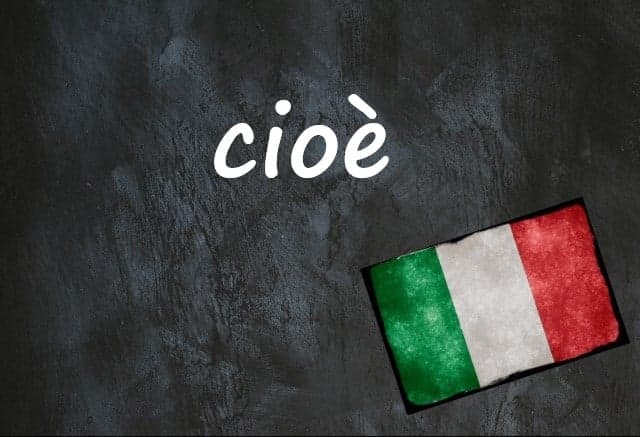Italian word of the day: 'Cioè'

This popular Italian word will help you express yourself more clearly – that is to say, better.
Once you get your tongue round the mouthful of vowels, cioè (pronounced "cho-eh") can come in very handy.
It's a contraction of ciò (this/that) and è (is), and it means "that is to say", "i.e.", "namely". It's a way to follow up on something you've just said and make it clearer or give more details.
Sono arrivato il 13, cioè domenica.
I arrived on the 13th, that is, Sunday.
Mi mancano ancora alcuni mobili, cioè: un tavolo, due sedie, un comodino.
I'm still missing some pieces of furniture, namely a table, two chairs, a bedside cabinet.
And when someone else hasn't been quite as clear as you'd like, you can turn cioè into a question to request an explanation.
– Vengo tra poco.
– Cioè?
– I'll come soon.
– Which means...?

You can also use cioè to correct yourself mid-sentence – a bit like saying "or rather" or "I mean..." after a slip of the tongue. When it's used this way you might hear people adding sì or no afterwards for extra emphasis.
Fai venire qui Luigi - Mario cioè.
Get Luigi, I mean Mario, to come here.
Questo è il mio, cioè no, il tuo!
This one's mine, or rather, yours!
Non posso venire, cioè sì, mi basta saperlo per tempo.
I can't come, or rather, I can, I just have to know in good time
But even when you're not quite sure what you mean, cioè's the word for you.
Nowadays you'll hear it used as a filler, a pausing word you can grab while you look for a better phrase. In fact for some Italian speakers, cioè has become a bit of a verbal tic – just like the word "like" in English.
Sì, cioè...
Yes, well, you know...
Cioè, è bello, vero?
Like, it's nice, isn't it?
And just like "like", cioè is beloved by teenagers – so much so that there's a teen magazine named after it. Like, cool!

A recent edition of Cioè.
Do you have an Italian word you'd like us to feature? If so, please email us with your suggestion.
Comments
See Also
Once you get your tongue round the mouthful of vowels, cioè (pronounced "cho-eh") can come in very handy.
It's a contraction of ciò (this/that) and è (is), and it means "that is to say", "i.e.", "namely". It's a way to follow up on something you've just said and make it clearer or give more details.
Sono arrivato il 13, cioè domenica.
I arrived on the 13th, that is, Sunday.
Mi mancano ancora alcuni mobili, cioè: un tavolo, due sedie, un comodino.
I'm still missing some pieces of furniture, namely a table, two chairs, a bedside cabinet.
And when someone else hasn't been quite as clear as you'd like, you can turn cioè into a question to request an explanation.
– Vengo tra poco.
– Cioè?
– I'll come soon.
– Which means...?

You can also use cioè to correct yourself mid-sentence – a bit like saying "or rather" or "I mean..." after a slip of the tongue. When it's used this way you might hear people adding sì or no afterwards for extra emphasis.
Fai venire qui Luigi - Mario cioè.
Get Luigi, I mean Mario, to come here.
Questo è il mio, cioè no, il tuo!
This one's mine, or rather, yours!
Non posso venire, cioè sì, mi basta saperlo per tempo.
I can't come, or rather, I can, I just have to know in good time
But even when you're not quite sure what you mean, cioè's the word for you.
Nowadays you'll hear it used as a filler, a pausing word you can grab while you look for a better phrase. In fact for some Italian speakers, cioè has become a bit of a verbal tic – just like the word "like" in English.
Sì, cioè...
Yes, well, you know...
Cioè, è bello, vero?
Like, it's nice, isn't it?
And just like "like", cioè is beloved by teenagers – so much so that there's a teen magazine named after it. Like, cool!

A recent edition of Cioè.
Do you have an Italian word you'd like us to feature? If so, please email us with your suggestion.

Join the conversation in our comments section below. Share your own views and experience and if you have a question or suggestion for our journalists then email us at [email protected].
Please keep comments civil, constructive and on topic – and make sure to read our terms of use before getting involved.
Please log in here to leave a comment.